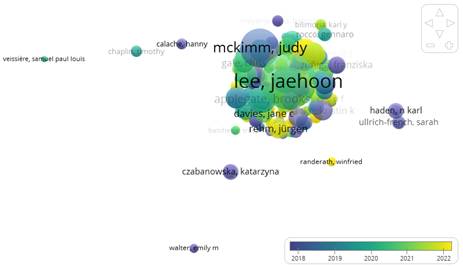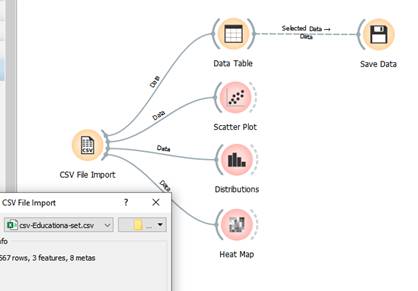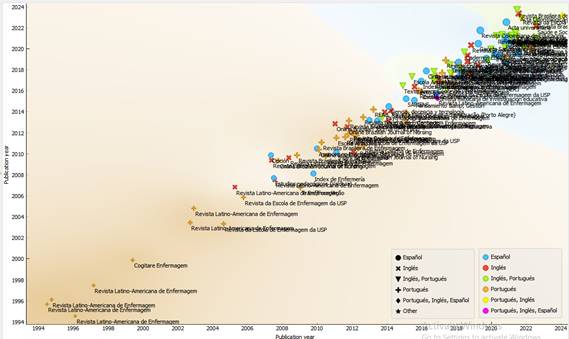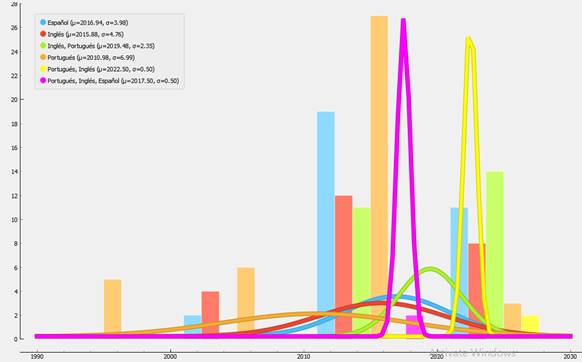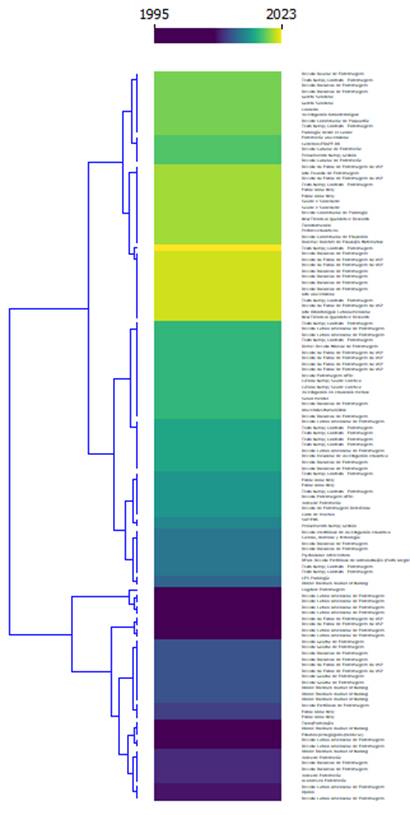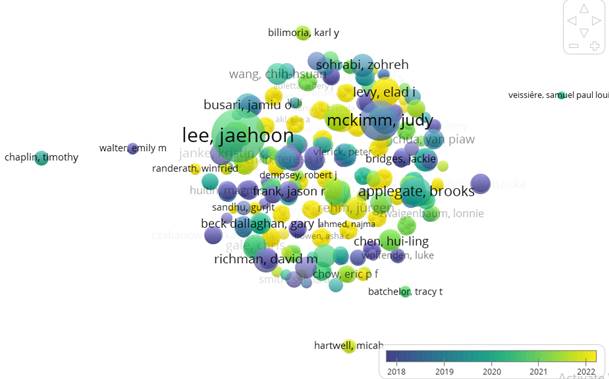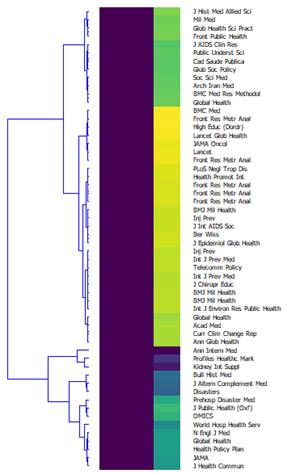Introduction
The field of educational leadership has gradually started to integrate a large gamut of theories and concepts to deal with increasing diversity and with the concurrent process of internationalization (Roche, 2013; Suttichujit, 2013). Nevertheless, there is a need for a more systematic and holistic approach to deal with the many challenges brought about by globalization and glocalization. Universities are at the forefront of the creation of knowledge and serve as nodes in complex transnational epistemic networks transcending the simplistic dichotomy separating theory and practice (Thapa & Feigenblatt, 2017). The movement of ideas, students, and professors is not new (Thelin, 2011). Medieval universities were characterized for their ease of movement from town to town based on the difficulties of gown and town relations. Nevertheless, the rise of the modern nation-state after the Peace of Westphalia, and in particular the centralization of education systems in many parts of the world during the twentieth century, involved the nation-state, in the conduct of interuniversity relations within and beyond state borders (Brunnee & Toope, 2006; Reinalda, 2009).
The integration of universities as part of the development strategies of nation-states resulted in the adoption of many practices from tradition interstate diplomacy into the realm of educational leadership. One outward sign of the influence of the nation-state can be found in the administrative structure adopted by some universities, which resembled the branches of the unitary nation-state, with cabinet members and chiefs of staff. Other universities kept more traditional structures which predate the independent nation-state but also started to engage in practices such as the negotiation of agreements of mutual understanding (MOUs), official visits, and articulation agreements. Thus, the language and form adopted for interuniversity relations gradually emulated traditional international relations. As Vinet (2010) said, through knowledge, universities help societies everywhere to move forward.
Nevertheless, the centralism envisioned by proponents of the sovereign nation-state was always an aspiration rather than a reality. Non-state actors continued to play a significant role and in the case of universities, a mayor role. Epistemic communities continued to transcend borders and many researchers held concurrent posts at institutions in different areas. The movement of entire university departments, for example in the case of several German universities, supports the assertion that the centrality of the state in the transnational network of universities was not as rigid as expected. Thus, even at the height of statism in the decades following World War II, non-state actors played a pivotal role in the development and growth of universities.
The final decades of the 20th century saw an increase in the movement of ideas and services, now known as globalization (Friedman, 2011). A particularly good definition of this complex phenomenon is the “compression of time and space.” This phenomenon flattened the world in terms of increasing interaction across borders and resulted in a much faster pace of interaction between transnational actors such as universities and professors. The increased pace was partly due to the development of information technology allowing more affordable communication and coordination. Universities adapted to this phenomenon by increasing efforts to internationalize and a plethora of partnerships at the international level came about. The present paper explores the role of academic diplomacy throughout the process of globalization and the subsequent transition to “globalization.” There is an emphasis on educational leadership and in the oscillation of the definition of the role in this interdisciplinary field.
Methods
Analysis and Synthesis: these methods are used to organize and combine the data and findings obtained from the collection of non-numerical information, to reach conclusions and understand the investigated phenomenon. In this research, it was used to process the information obtained from the literature review, specialized documentation, to develop conclusions on the topic addressed.
Systemic - structural: these methods are used to analyze and understand complex systems and interdependent relationships in different fields, such as psychotherapy, organizational analysis, social research, among others. They focus on identifying underlying patterns and structures in systems, to explain how they work and how they can be improved. In the present investigation, it was applied in the analysis of the concept of academic diplomacy and the role of the diplomat.
Inductive-deductive: these methods are used to develop and validate theories based on the observation and analysis of concrete and specific data, and then generalize them to a broader level. The inductive method begins with the collection of empirical data and the identification of patterns, to then formulate hypotheses and theories. The deductive method is a systematic and logical approach to research that is based on the application of previous theories and hypotheses to predict and explain the findings in the data. In the context of research, they are used to better understand educational phenomena through the application of previous theories and the formulation of hypotheses that are tested with the collected data. In this way, rigorous and reliable research is obtained that can inform and improve educational practice.
Logical history: these methods are used to analyze and understand historical and logical processes and developments. In this research applied to grounded theory in secondary education, he combines historical perspective with logic and argumentation to examine and understand the evolution and development of concepts, theories and practices in education. It is used to analyze the context and circumstances that influence theory formation and change and to assess the logical validity and internal consistency of arguments and theories.
Descriptive method: it is used to describe and represent in an objective and detailed manner the characteristics, attributes and patterns of a phenomenon or situation in this research applied to the proposed exploratory study method. This approach is used to obtain a clear and precise understanding of the situation or problem under investigation, without trying to explain or understand the underlying causes or relationships. It is useful for establishing a precise frame of reference and for providing a solid foundation for future research and decision-making.
Exploratory Study
An exploratory study is a type of research that aims to gain an initial and general understanding of a phenomenon or problem. It is used to identify and define the research problem, to establish hypotheses, and to develop a plan for future more rigorous studies. This type of study is usually non-experimental and descriptive and is based on the collection and analysis of secondary data or on interviews and surveys with key informants. They are normally carried out when the objective is to examine a subject or research problem that has been little studied or that has not been addressed before. They are characterized by being more flexible and extensive in their methodology compared to descriptive or explanatory studies. Exploratory research is a type of research used to study a problem. s a very flexible technique, compared to other types of study, it implies that the investigator is willing to take risks, be patient and receptive. It is usually carried out when the problem is in a preliminary phase. It is often called the grounded theory approach or interpretive research, as it is used to answer what, why, and how questions. It is important to mention that exploratory research is responsible for generating hypotheses that promote the development of a deeper study from which results and a conclusion are drawn (QuestionPro, 2023). As you can see in Figure 1.
Characteristics of exploratory research
Exploratory research has multiple characteristics that give it an advantage over other methods. The main ones are (QuestionPro, 2023):
When defining your concepts, prioritize people's points of view.
It is focused on the knowledge that one has of a subject, so the meaning is unique and innovative.
It does not have an obligatory structure, so the researcher can follow the process that seems easiest to him.
Find a solution to problems that were not taken into account in the past.
Types and methodologies of exploratory research
While it may seem a bit difficult to investigate something for which there is extraordinarily little information, there are several methods that can help a researcher decide the best process, data collection methods, and choice of subjects. There are two ways to conduct primary and secondary research. Under these two types, there are multiple methods that a researcher can use. The data obtained can be qualitative or quantitative (QuestionPro, 2023).
Results
Globalization and “Glocalization: Academic Diplomacy in Transition
As previously mentioned, academic diplomacy initially emulated interstate diplomacy and thus was highly ritualized and centralized. One of the strengths of traditional diplomacy is that over the centuries it has achieved an elevated level of standardization and therefore the rules of behavior and procedures of engagement are advanced and universally accepted. There are clear rules about how to start the negotiations for a memorandum of understanding and there are also extremely strict rules about who can initiate those negotiations. Nevertheless, traditional diplomacy tends to be slow and favors interaction between the heads of institutions at the expense of a wider range of actors (Cozette, 2008). Of late, practical, and theoretical interest in diplomacy and diplomatic studies has grown, prompting a number of diplomatic scholars to undertake a long overdue stock take of the past, present, and future of the subfield (Murray, et al, 2011).
One of the main characteristics of globalization was an increase in the pace of change and therefore many universities and educational institutions realized that in the same way in which formal diplomacy had to be complemented with more flexible track two diplomacy and citizen-citizen diplomacy, it was also necessary for them to provide alternative avenues for transnational engagement (Feigenblatt, 2016). Moreover, many traditional universities never completely adopted the traditional interstate model and continued to keep a more decentralized structure, making them more open to alternative forms of transnational engagement.
One of the challenges faced by the phenomenon known as “globalization” is that even though “space and time” were compressed, global solutions cannot always be directly implemented at the local level without taking into consideration the local context and needs (Feigenblatt, 2021; MacFarlane & Khong, 2006). This is something that educational institutions have understood for a long time with an emphasis on gown and town relations. Nevertheless, the challenge was and still is to integrate the realization of thinking global but acting locally into academic diplomacy. Traditional leadership programs in the field of education integrate the teaching of the importance of community-school relations but this is taught as part of the public policy process and decision-making process. Moreover, the emphasis is on theories borrowed from public relations and organizational behavior rather than from diplomacy.
Educational leaders need to understand both the global and local levels of decision-making and be able to engage with other institutions and actors constructively. Furthermore, educational leaders need to be able to engage in systems thinking while also paying attention to communication issues affecting their local communities. Thus, the challenge is to integrate theories and experiences from a wide range of disciplines to develop a curriculum for academic diplomacy that the caters to the changing needs of educational leaders in the 21st century.
The Role of the Academic Diplomat
The previous sections of this exploratory paper have provided a macro level context for a discussion on the role of the academic diplomat. To a certain extend all educational leaders must serve as academic diplomats. Thus, the need and functions are not new but the need for a conscious and purposeful understanding of the role is new. Educational leaders understand that they need to engage in maintaining good relationships with the community and with a wide range of stakeholders (Feigenblatt & Peña-Acuña, 2020; Feigenblatt, Rivera, et al., 2022). In addition to good relationships with stakeholders, educational leaders are also aware of the need for a wide range of methods to communicate with the wider community.
The challenge is to carve out a clear role and status within the educational leadership community for academic diplomacy. At this point there is a wide range of university positions which are somehow involved in academic diplomacy, nevertheless academic diplomacy is one of many functions for those positions. One example is the role of director of internationalization. Many universities have offices for internationalization which focus on international relations and study abroad programs (Feigenblatt & Gavilondo, 2022). Offices for internationalization have a range of functions that do not always coincide with those of a diplomatic mission. One aspect that is usually particularly lacking is an office to welcome international visitors on official visit. This function tends to be shared by many departments or in some cases it is reserved to the office of the university president or rector. One of several exceptions to this, is Harvard University which has the office of the University Marshall. This office oversees welcoming foreign delegations visiting the University. Members of the office are trained in diplomatic etiquette to welcome a range of guests including heads of state. The difference between the office of the University Marshall at Harvard University and offices o internationalization in other universities is that it is designed to welcome foreign delegations and that it is trained to do so following an international standard of etiquette. Offices of internationalization tend to have many more functions which may include promoting student exchange programs and the negotiation of specific articulation agreements.
The emphasis for this section is on the role and status of an academic diplomat and thus issues of training and basic knowledge of diplomatic etiquette are pertinent. It should be noted that academic diplomacy is not the same thing as inter-organizational relations or internationalization (Feigenblatt et al., 2021). Diplomacy implies a certain set of skills employed to promote relations between entities. Traditionally diplomacy has focused on the development of a range of skills combining communication, negotiation, and leadership framed by knowledge and respect of certain social norms and practices. Therefore, diplomacy transcends technical knowledge regarding internationalization and international relations in general.
The development of academic diplomacy within educational leadership requires the integration of traditional diplomacy with theories of educational leadership. Thus, even though much can be learned from programs to train traditional diplomats, those skills and theories need to be adapted to the specific needs of educational leadership. One of the important differences is that the emphasis in academic diplomacy is transnational non-state relationships. Another difference is in terms of content. Even though diplomats tend to be generalists by nature and thus can quickly learn about a wide range of subjects, in the field of educational leadership there are a few basic topics which are basic knowledge for educational leaders such as curriculum design and educational administration, inter alia. Another significant difference is that academic diplomacy is more decentralized by nature than traditional diplomacy and thus a wider range of actors needs to receive training in the tools and skills to fulfill this role.
Analysis bibliometric by concepts
Educational Leadership: Drawing conclusions about academic publications on educational leadership requires a thorough and systematic review of existing literature. That is the reason for the author expose the Figure 2, 3, 4, 5 and Figure 6:
After having analyzed the earlier figures, it can be said that:
Context: it is important to consider the context in which the publications are developed, including the country, region, educational system, and relevant educational policies.
Theoretical approaches: there are various theoretical approaches to educational leadership, and it is important to take into account the different theoretical approaches used in the publications.
Research methods: the research methods used in the publications can vary, and it is important to take into account the methods used in each study to evaluate the robustness and reliability of the results.
Results: it is important to examine the results of the studies and evaluate if there is consistency between the results of different studies.
Limitations: it is important to identify and consider the limitations of the studies, including methodological limitations, sample limitations, and limitations in generalizing the results.
After considering that, it can be said that there are several theoretical approaches to educational leadership and that the results of the studies vary according to the theoretical approach used. It is also necessary to say that there are limitations in the research on educational leadership in a focused way, for which reason it is considered that more solid and rigorous studies are needed to improve the understanding of educational leadership.
Academic diplomacy
 Source: Own elaboration
Source: Own elaborationFig. 7 - Analysis through VOS viewer. Comparative analysis according to periods of publications.
After analyzing the bibliography as shown in the Figure 7, 8, 9, 10 and Figure 11 it can be said that:
Definition and Scope: It is important to establish a clear definition and scope of academic diplomacy, as the concept may be interpreted differently in different publications.
Context: It is important to take into account the context in which the publications are developed, including the historical, political and cultural context of the countries and regions involved.
Theoretical Frameworks: There may be several theoretical frameworks used to analyze academic diplomacy, and it is important to take these frameworks into account when drawing conclusions.
Research Methods: The research methods used in the publications may vary, and it is important to consider the methods used in each study to assess the robustness and reliability of the results.
Results: It is important to examine the results of the studies and assess whether there is consistency between the results of the different studies.
Limitations: It is important to identify and consider the limitations of the studies, including methodological limitations, sample limitations, and limitations in the generalizability of the results.
After considering those factors, it can be concluded that a clearer definition and scope of academic diplomacy is needed, and that the concept is influenced by various historical, political, and cultural factors. It can also be said that various theoretical frameworks are used to analyze academic diplomacy and that more research using rigorous methods is needed to better understand its impact.
Conclusions
This brief exploratory study of academic diplomacy posits a tentative integrative approach to educational leadership which combines theories and practices borrowed from traditional interstate diplomacy with best practices developed in the field of education and applied anthropology. A transnational model of academic diplomacy has the advantage of allowing for greater flexibility of movement for academic creativity and acknowledges the “glocalized” nature of contemporary higher education.














